Demolition Contractors Clay Cross
Top 10 Building Demolition in Clay Cross
Receive up to 3 Demolition Contractors quotes for your project today! Compare profiles, reviews, accreditations, portfolio, etc... and choose the best offer.

GB Groundworks and Construction Ltd
44 reviews285 Ringinglow Rd, Sheffield, S11 7PZ, GBWelcome to GB Groundworks We are a small construction company with a focus on quality and delivering niche projects. Grounded in excavation and groundworks but with a family history of development we can offer the full package from breaking ground to completion in the commercial and domestic realms. We are experienced providers of solutions from design to final finish, incorporating piling, groundworks, foundations, extensions, new builds, landscaping, equestrian construction all completed with a high degree of skill and attention to detail. Commercially we’ve cut our teeth working in heavy industry factories installing machine bases, press pits, foundations and concrete tanks for production lines as well as welfare and Laboratory facilities. Domestically we undertake a diverse range of jobs from footings, drainage, landscaping, driveways, full extensions or just to damp packages, full new builds and more civil style works with retaining walls, rivers works, piling and concrete ring beams, fencing and basements. In the Equestrian field we work with domestic and commercial clients from menages, arenas stables, concrete yards, land drainage, fencing, field maintenance and more. We are currently having some email problems please use [email protected] to contact us.
- Services
- Why Us?
- Gallery
Get Quote
Bespoke Builders York
Rotherham, GBAbout South Yorkshire Building Network Your building project deserves the best … Highest standard project management and workmanship Carefully matched to existing building style and materials Compliant with building regulations and codes of practice. Members of the South Yorkshire Building Network can undertake any construction project in South Yorkshire, and nothing is too small or too complicated. Be it renovations, woodwork, bathroom and kitchen fitting, extensions and conversions, plumbing or joinery, our approved panel of building contractors are here to build your perfect home using the latest designs, highest quality materials and all of our expertise! Our experienced builders will complete each stage of your domestic or commercial project, from the conception of the plumbing and heating system to the decorations to complicated electrical wiring. If you are looking for local builders in South Yorkshire, get in touch today. Our members are competitively priced with an excellent track record of customer satisfaction.
- Services
- Why Us?
- Gallery
Get Quote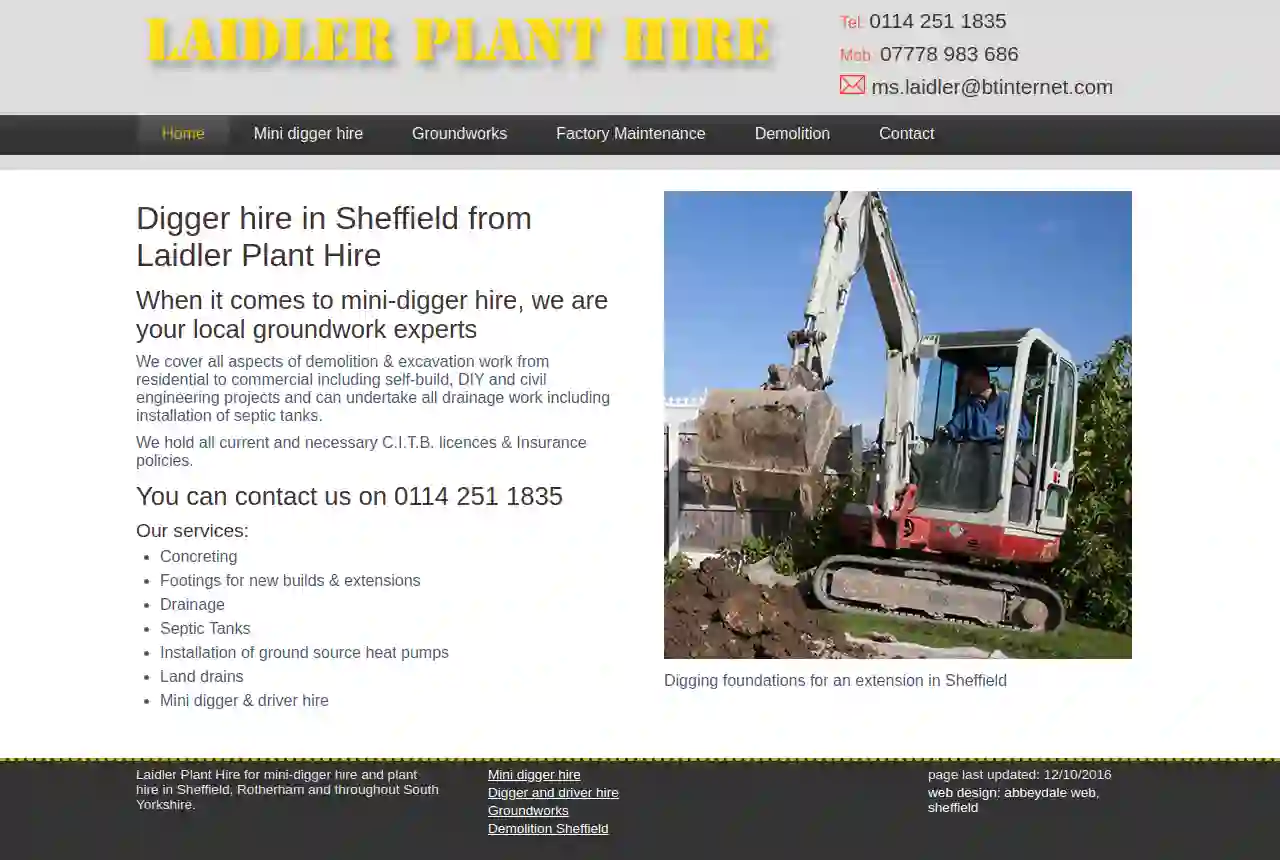
Laidler Plant Hire Ltd
1 Upperthorpe Rd, Killamarsh Sheffield, South Yorkshire, 1 Upperthorpe RdKillamarsh Sheffield, Sheffield, S21 1EQ, GBLaidler Plant Hire: Your Local Groundwork Experts in Sheffield When it comes to mini-digger hire, Laidler Plant Hire is your trusted partner for all your groundwork needs in Sheffield and surrounding areas. We offer a comprehensive range of services, from residential and commercial demolition and excavation to self-build, DIY, and civil engineering projects. Our expertise extends to drainage work, including the installation of septic tanks, and we are fully equipped to handle all your ground source heat pump installations and land drain requirements. We are committed to providing high-quality services and hold all necessary C.I.T.B. licenses and insurance policies, ensuring your peace of mind. Our team of experienced professionals is dedicated to delivering exceptional results, exceeding your expectations on every project. Contact us today for a free quote and let us help you bring your vision to life.
- Services
- Why Us?
- Our Team
- Gallery
Get Quote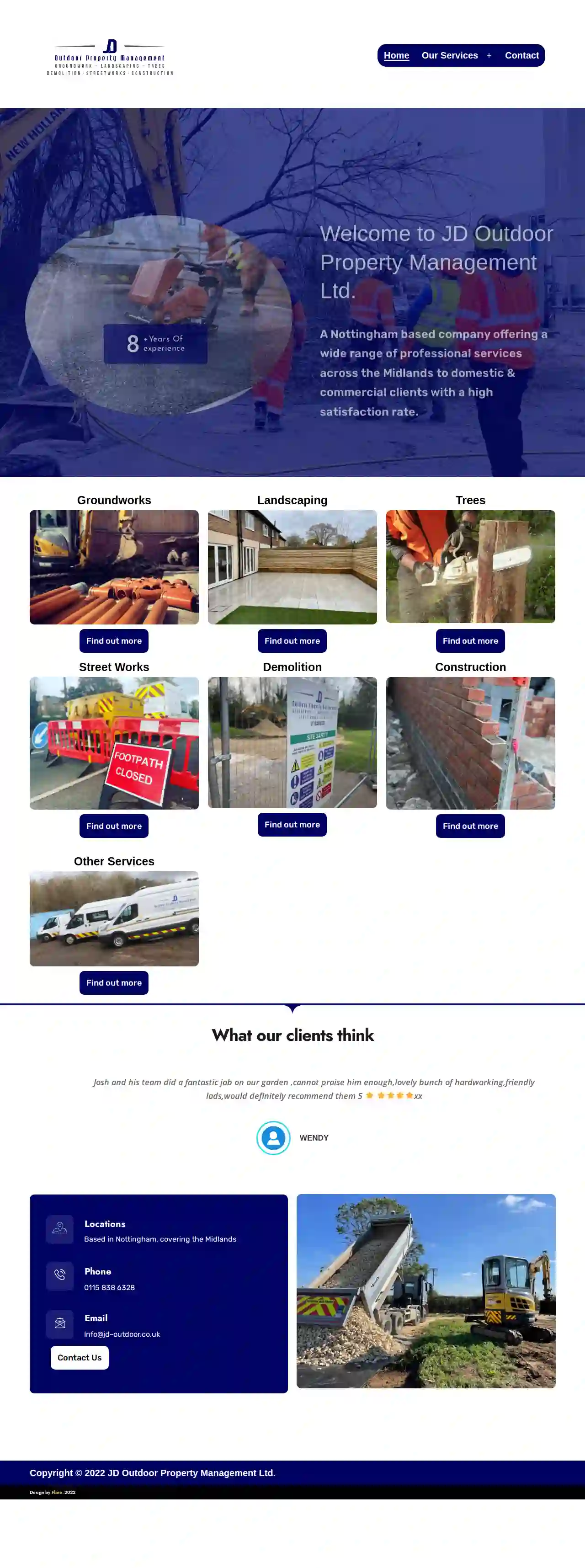
JD Outdoor Property Management
532 reviewsNottingham, GBWelcome to JD Outdoor Property Management Ltd. A Nottingham based company offering a wide range of professional services across the Midlands to domestic & commercial clients with a high satisfaction rate.
- Services
- Why Us?
- Testimonials
- Gallery
Get Quote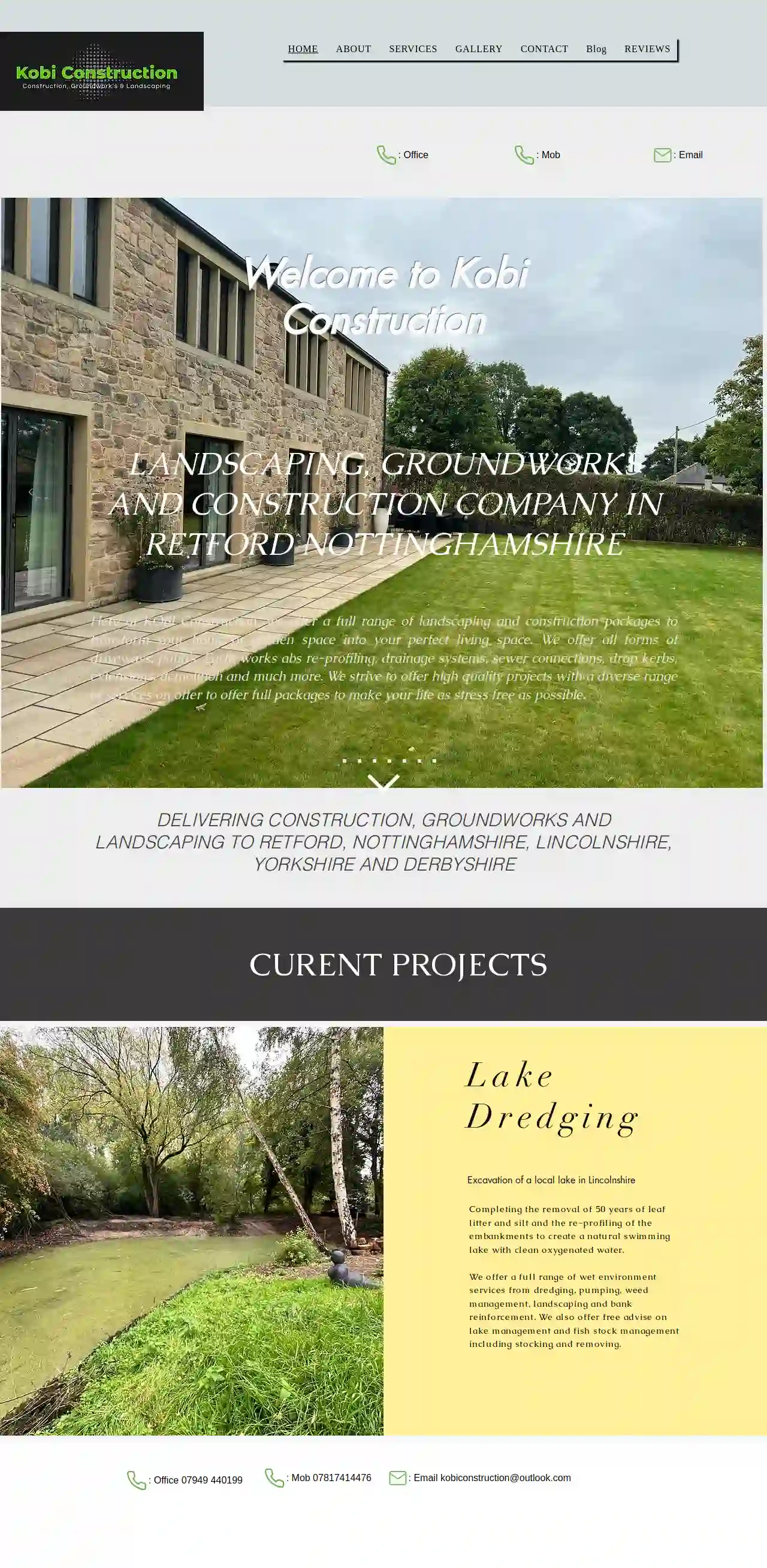
Kobi construction Ltd
53 reviewsWorksop, GBWelcome to Kobi Construction LANDSCAPING, GROUNDWORKS AND CONSTRUCTION COMPANY IN RETFORD NOTTINGHAMSHIRE Here at KOBI Construction, we offer a full range of landscaping and construction packages to transform your home or garden space into your perfect living space. We offer all forms of driveways, patios, Earth works abs re-profiling, drainage systems, sewer connections, drop kerbs, extensions, demolition and much more. We strive to offer high quality projects with a diverse range of services on offer to offer full packages to make your life as stress free as possible.
- Services
- Why Us?
- Gallery
Get Quote
SG Design and Build (construction) ltd
51 reviewsLONG ROW, BELPER, LONG ROW BELPER DERBYSHIRE, Belper, DE56 1DR, GBSG Architectural Design Based in Belper, Derbyshire, SG Architectural Design provides a comprehensive range of architectural design services for both residential and commercial clients throughout the Amber Valley and Derbyshire. We specialize in creating bespoke designs that meet your specific needs and budget, while ensuring compliance with all relevant planning and building regulations. Our team has extensive experience in a variety of roles, from surveying to site management, and we are committed to providing our clients with a personalized and supportive service. We work closely with you throughout the entire process, from initial concept to final completion, to ensure that your project is delivered on time and within budget. We offer a wide range of services, including: Planning Drawings / Building Control Drawings Single Storey Extensions Two Storey House Extensions New Build Garages / Outbuildings Full Planning Applications Change of use applications Listed Building Consent Conservation Area Consent Permitted Development Cost and Project Appraisals Drawings and Specifications Project Management We are proud of our 98% pass rate for drawing and planning applications over the past 10 years, and we are committed to providing our clients with the highest level of service and expertise. Contact us today to discuss your project and see how we can help you achieve your dream home or commercial space.
- Services
- Why Us?
- Our Team
- Gallery
Get Quote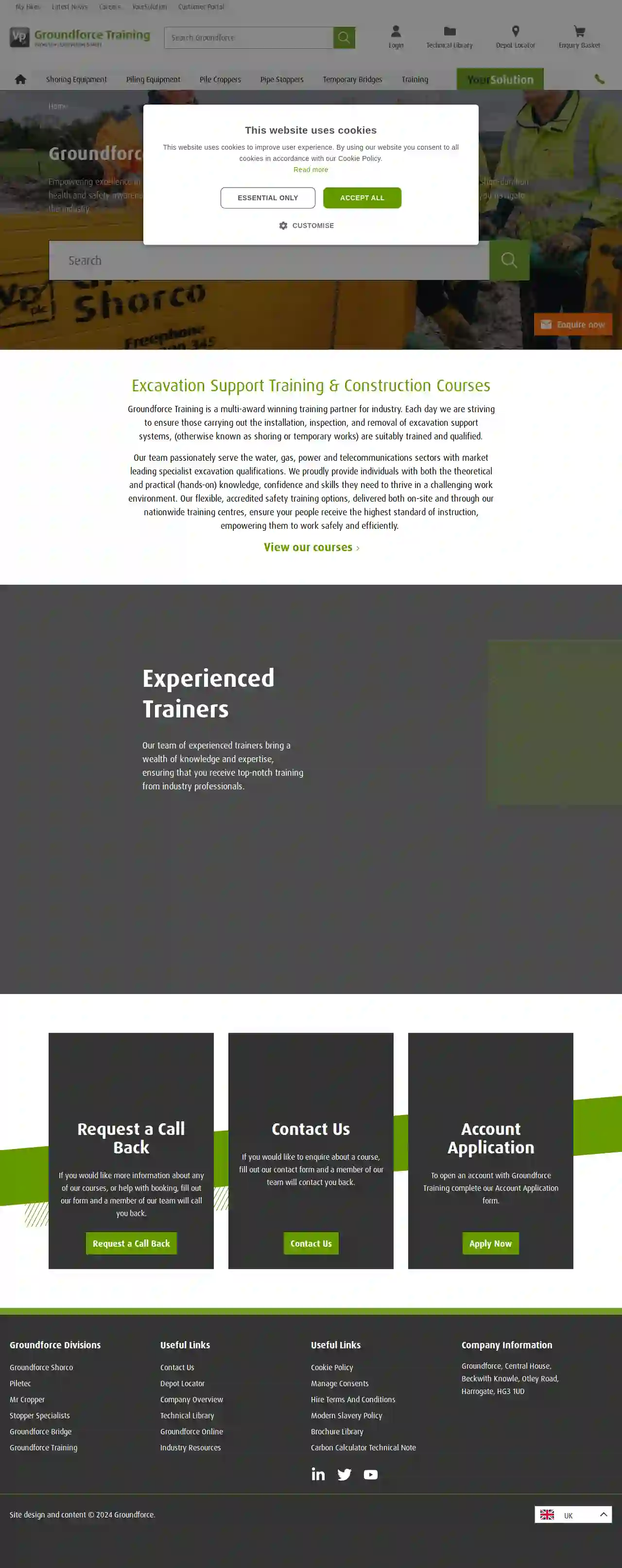
Groundforce Training Services - Excavation Safety
4.9389 reviewsCentral House, Beckwith Knowle, Otley Road, Harrogate, HG3 1UD, GBGroundforce: Your Partner in Safety and Efficiency Groundforce is a leading provider of shoring, piling, and excavation safety solutions. We offer a wide range of products and services to meet the needs of our customers in the construction, infrastructure, and utilities sectors. Our commitment to safety and efficiency is reflected in everything we do, from the design and manufacture of our products to the training we provide to our customers. Our History Groundforce has been in business for over 50 years, and we have a long history of providing innovative and reliable solutions to our customers. We are constantly investing in research and development to ensure that our products and services are at the forefront of the industry. Our Mission Our mission is to provide our customers with the safest and most efficient solutions possible. We are committed to providing our customers with the highest level of service and support. We believe that our customers are our most valuable asset, and we are dedicated to building long-term relationships with them. Our Team Our team is made up of experienced professionals who are passionate about safety and efficiency. We are committed to providing our customers with the best possible experience. We are always available to answer your questions and provide you with the support you need.
- Services
- Why Us?
- Accreditations
- Gallery
Get Quote
Arnold Excavation & Hauling, LLC
51 reviewsBatesville, GBArnold Excavation & Hauling, LLC Arnold Excavation & Hauling, LLC offers residential excavation and has been serving the area for over 30 years. Our reputation is built off of relationships with custom local builders, architects, landscape architects, homeowners as well as estate managers. We are a Class A Contractor, committed to providing high-quality excavation services to our clients in Albemarle County and the surrounding Charlottesville Metro Area. Our team is experienced in a wide range of excavation projects, including:
- Services
- Why Us?
- Gallery
Get Quote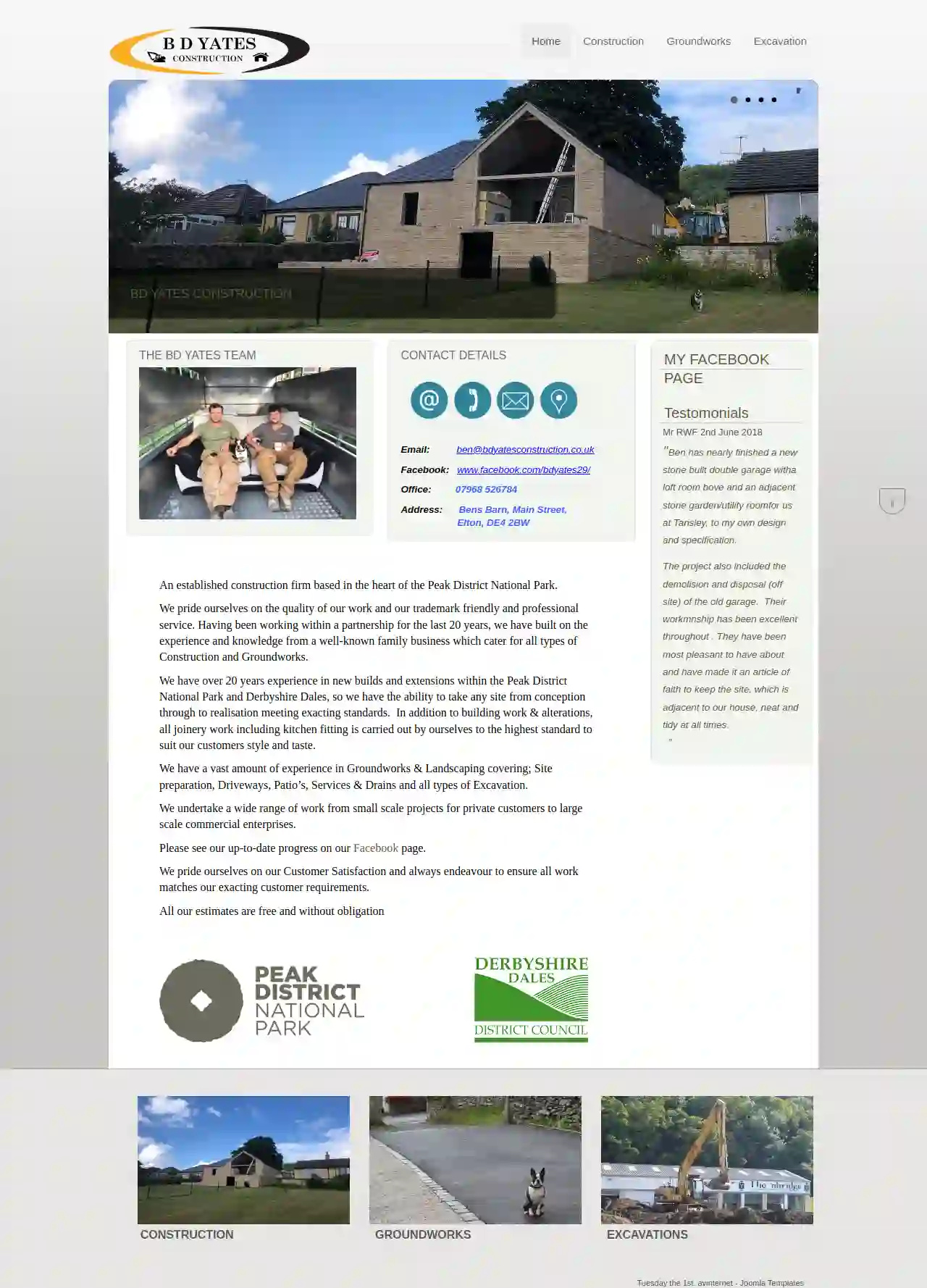
BD Yates Construction Ltd
56 reviewsBens Barn, Main Street, Elton, DE4 2BW, GBAn established construction firm based in the heart of the Peak District National Park. We pride ourselves on the quality of our work and our trademark friendly and professional service. Having been working within a partnership for the last 20 years, we have built on the experience and knowledge from a well-known family business which cater for all types of Construction and Groundworks. We have over 20 years experience in new builds and extensions within the Peak District National Park and Derbyshire Dales, so we have the ability to take any site from conception through to realisation meeting exacting standards. In addition to building work & alterations, all joinery work including kitchen fitting is carried out by ourselves to the highest standard to suit our customers style and taste. We have a vast amount of experience in Groundworks & Landscaping covering; Site preparation, Driveways, Patio’s, Services & Drains and all types of Excavation. We undertake a wide range of work from small scale projects for private customers to large scale commercial enterprises. Please see our up-to-date progress on our Facebook page. We pride ourselves on our Customer Satisfaction and always endeavour to ensure all work matches our exacting customer requirements. All our estimates are free and without obligation
- Services
- Why Us?
- Testimonials
- Gallery
Get Quote
G R Day Operated Mini Diggers, Extension Bases and Excavations.
525 reviews18 nesfield close, alvaston, derby, derbyshire, Derby, DE24 0QT, GBAbout G. R. Day With over 20 years of experience, G. R. Day offers a reliable and professional service. Fully insured and CPCS qualified, there's not much Gavin hasn't done on a digger. He has a variety of attachments for his machines, including land rakes, riddle buckets, ripper teeth, and grabble thumbs. He also has concrete breakers to make light work of breaking out concrete drives, concrete bases, and existing footings. Why Choose G. R. Day? Over 20 years of experience DBS Checked Fully insured CPCS qualified Professional and reliable Get in touch for your free, no-obligation quote today.
- Services
- Why Us?
- Our Team
- Testimonials
- Gallery
Get Quote
Over 13,059+ Excavation Pros in our network
Our excavation companies operate in Clay Cross & surroundings!
ExcavationHQ has curated and vetted the Best Excavation Contractors in and around Clay Cross. Find a trustworthy contractor today.
Frequently Asked Questions About Demolition Contractors
- Size and Complexity of the Structure: Larger and more complex structures, such as multi-story buildings, require more time, labor, and specialized equipment, increasing costs.
- Type of Demolition: Different demolition methods, such as implosion, wrecking ball, or high-reach demolition, have varying costs.
- Material Disposal: Disposal fees for demolition debris can contribute significantly to the overall cost, depending on the type and quantity of materials.
- Location and Accessibility: Demolition in densely populated areas or with limited access may require more planning and specialized equipment, affecting costs.
- Hazardous Materials: The presence of asbestos, lead paint, or other hazardous materials requires specialized removal and disposal procedures, adding to the expenses.
- Safety: Experienced contractors have the knowledge, skills, and safety training to execute demolitions safely, minimizing risks to workers and surrounding areas.
- Efficiency: Contractors have the specialized equipment and expertise to complete demolitions efficiently, saving time and reducing project costs.
- Compliance: Reputable contractors are familiar with local regulations and permitting requirements, ensuring compliance and avoiding legal issues.
- Waste Management: Contractors have waste management plans to handle debris responsibly, including recycling and proper disposal.
- Liability Protection: Insured contractors protect you from financial responsibility for accidents or damages during the demolition process.
- Feasibility Studies: Assessing the viability and challenges of a demolition project.
- Demolition Planning: Developing demolition plans, including method selection, sequencing, and safety procedures.
- Permitting Assistance: Navigating the demolition permitting process and ensuring compliance with regulations.
- Hazardous Material Surveys: Identifying and managing hazardous materials, such as asbestos and lead paint.
- Cost Estimating: Providing accurate cost estimates for demolition services.
- Project Management: Overseeing the demolition process and ensuring it proceeds as planned.
How long does a demolition project take?
How much does demolition cost in the UK?
What are the benefits of hiring a professional demolition contractor?
What is the role of a demolition consultant?
How long does a demolition project take?
How much does demolition cost in the UK?
- Size and Complexity of the Structure: Larger and more complex structures, such as multi-story buildings, require more time, labor, and specialized equipment, increasing costs.
- Type of Demolition: Different demolition methods, such as implosion, wrecking ball, or high-reach demolition, have varying costs.
- Material Disposal: Disposal fees for demolition debris can contribute significantly to the overall cost, depending on the type and quantity of materials.
- Location and Accessibility: Demolition in densely populated areas or with limited access may require more planning and specialized equipment, affecting costs.
- Hazardous Materials: The presence of asbestos, lead paint, or other hazardous materials requires specialized removal and disposal procedures, adding to the expenses.
What are the benefits of hiring a professional demolition contractor?
- Safety: Experienced contractors have the knowledge, skills, and safety training to execute demolitions safely, minimizing risks to workers and surrounding areas.
- Efficiency: Contractors have the specialized equipment and expertise to complete demolitions efficiently, saving time and reducing project costs.
- Compliance: Reputable contractors are familiar with local regulations and permitting requirements, ensuring compliance and avoiding legal issues.
- Waste Management: Contractors have waste management plans to handle debris responsibly, including recycling and proper disposal.
- Liability Protection: Insured contractors protect you from financial responsibility for accidents or damages during the demolition process.
What is the role of a demolition consultant?
- Feasibility Studies: Assessing the viability and challenges of a demolition project.
- Demolition Planning: Developing demolition plans, including method selection, sequencing, and safety procedures.
- Permitting Assistance: Navigating the demolition permitting process and ensuring compliance with regulations.
- Hazardous Material Surveys: Identifying and managing hazardous materials, such as asbestos and lead paint.
- Cost Estimating: Providing accurate cost estimates for demolition services.
- Project Management: Overseeing the demolition process and ensuring it proceeds as planned.